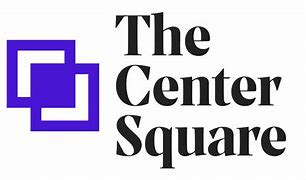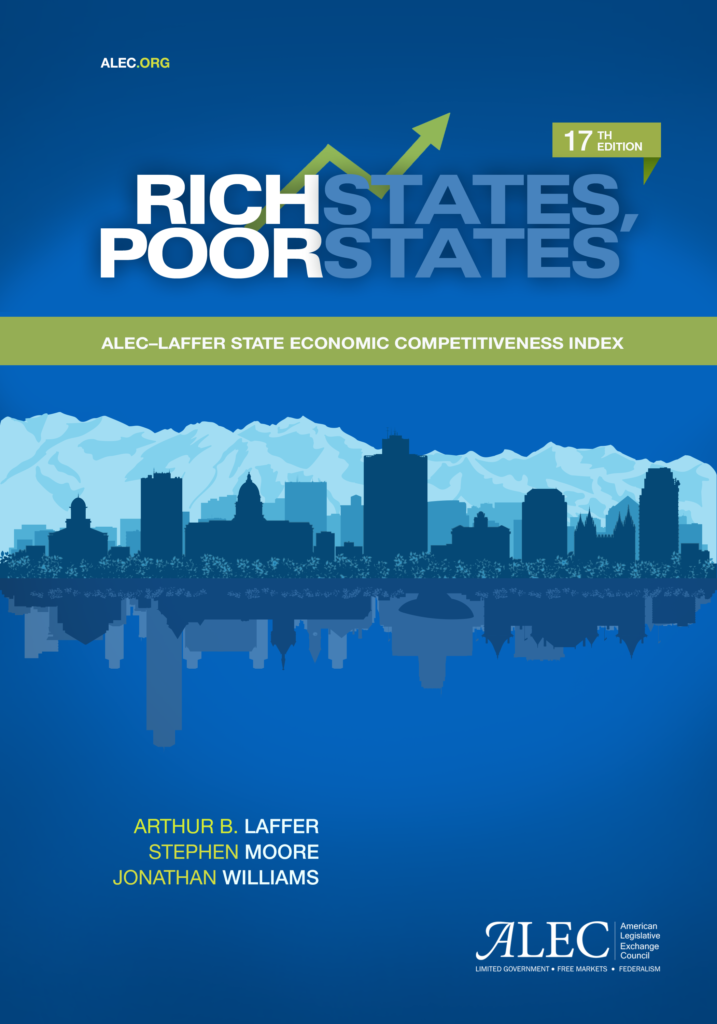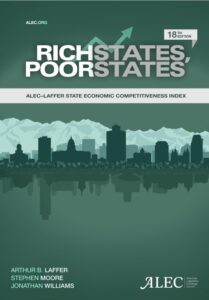
Kansas Governor Sam Brownback boasted Kansas is the “envy of the world” and “the state of our state is indeed strong.” Despite the struggles in certain sectors of the economy-notably oil and gas along with agriculture — the governor reminded the audience of the state’s “record population, record new businesses, record grain production, and record income.” As a result of the tax cuts on small businesses back in 2013, “we boast a record number of new businesses here…Businesses from Missouri are moving across the border, making Kansas City more of a Kansas city.”
Just a few years ago, the state experienced a vast improvement in economic outlook, thanks to tax reforms in 2013; Kansas’ outlook jumped from 26th in 2012 all the way to 11th just one year later.
But in the recently released 9th edition of the Rich States, Poor States: ALEC-Laffer State Economic Competitiveness Index, Kansas ranked 27th in both Economic Outlook and Economic Performance. This middling outlook represents a deterioration for the third year in a row as a result of new taxes. For instance, Kansas ranks 47th nationally in the fiscal impact on personal income from recently legislated tax changes.
But the governor only hinted at potential tax increases: “We will propose modest, targeted revenue measures to fund essential state services.” But the governor’s budget report released on January 11 did far more than hint. Recommendations include increasing cigarette taxes by $1 per pack (a 78 percent increase) on top of a $.50 per pack increase in 2015, doubling the tobacco products tax from 10 percent to 20 percent, and doubling the liquor enforcement tax from 8 percent to 16 percent. In addition, it freezes the bottom income tax bracket (rather than continue the scheduled cuts), quintuples the annual report filing fee for businesses, and taxes passive income. All told, the budget proposal calls for tax hikes of nearly $380 million over two years.
Any such tax increases would diminish hard fought attempts to bolster the economic competitiveness of Kansas, something the state cannot afford. The point of tax reform was to make Kansas more competitive through tax relief, not grow spending and then backfill the budget with discriminatory tax increases aimed at certain segments of the population.
Perhaps it’s time to give more consideration to the recommendations drafted by Alvarez & Marsal at the behest of the Kansas legislature which would have saved Kansas taxpayers $2 billion over five years. In fact, Brownback stressed a commitment to streamlining operations by “finding necessary efficiencies” while still supporting “the core functions of state government.” Presently, Kansas employs 672 people per 10,000 residents-a higher ratio than 46 other states. Grasping the gravity of the problem, the governor rhetorically inquired, “Can we really ask Kansans to pay more for a government that maintains separate bureaucracies to license the practice of barbering AND cosmetology?…Do we continue to need separate departments to regulate the state insurance and securities markets?”
One area in which Kansas continued to shine in 2016 was on healthcare. The governor noted the majority of the 23 Obamacare state exchanges have failed. The decision to turn down the $31.5 million grant to engage in early adoption “looks increasingly like declining a discount ticket on the Titanic…Given these facts, it would be foolish to endorse the ObamaCare expansion of Medicaid now—akin to airlifting on to the Titanic.” Under Governor Brownback’s leadership, Kansas became the first in the nation to serve its Medicaid population through managed care. The financial pitfalls soon to be experienced by states which “followed the siren song of the Affordable Care Act” will be avoided by Kansas.
Perhaps the most interesting remarks by Governor Brownback centered on education reform. He bemoaned that “for decades, the children of Kansas suffered under an overly complicated education finance formula that lacked accountability for results, hand-cuffed local school boards, and spent money unrelated to student achievement.” The governor promised greater transparency for reporting performance of individual schools to the public along with funds for teacher merit based pay increases. Of high importance, he also called for an expansion of the tax exempt scholarship program. “The zip code in which you are born should not determine the quality of education you receive,” said the governor. Some of these proposed reforms will prove controversial. But this is a political battle with meaningful benefits for the next generation.
Kansas benefited from the tax reforms of 2013 with a wave of private sector business growth. But the reality is tax cuts alone are just part of the puzzle; spending and regulatory reforms are required as well. Governor Brownback’s focus on introducing further revamps of agencies, healthcare, and education bodes well. However, saddling Kansas taxpayers with hundreds of millions of dollars of varied tax increases is counterproductive. The legislature should breathe reality into the governor’s promise that “the days of tax first, cut never have come to an end.”




